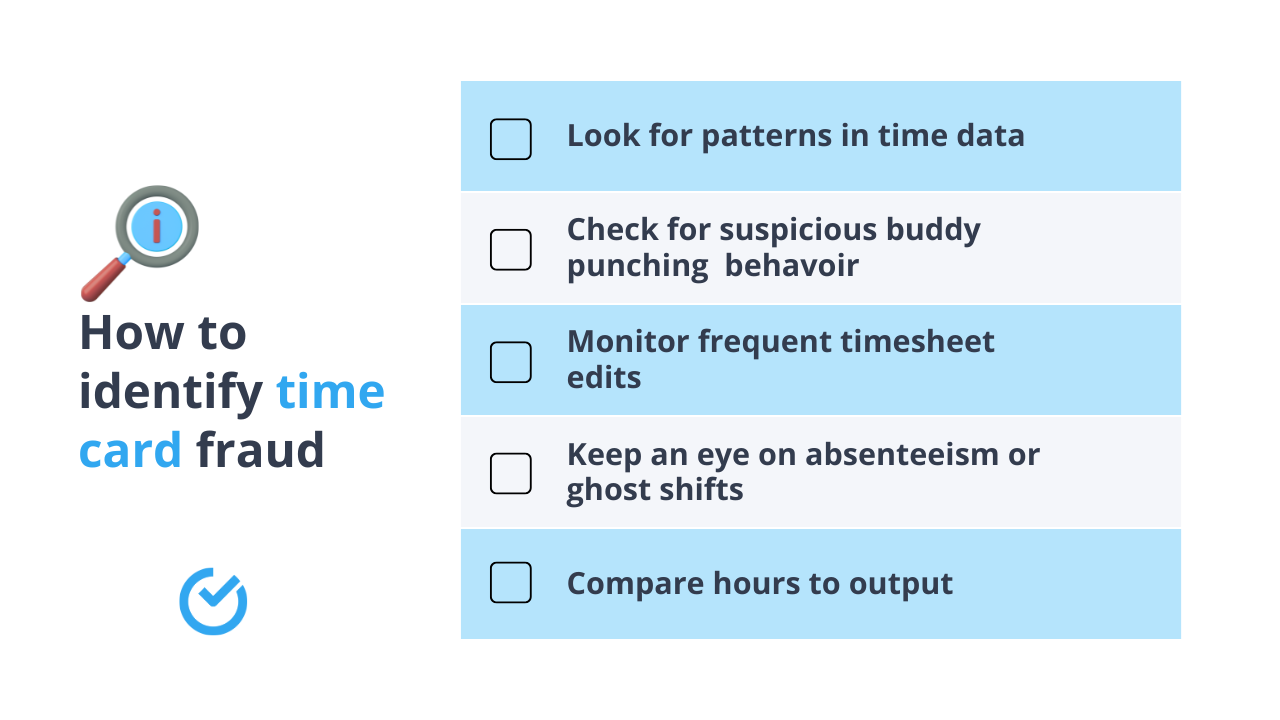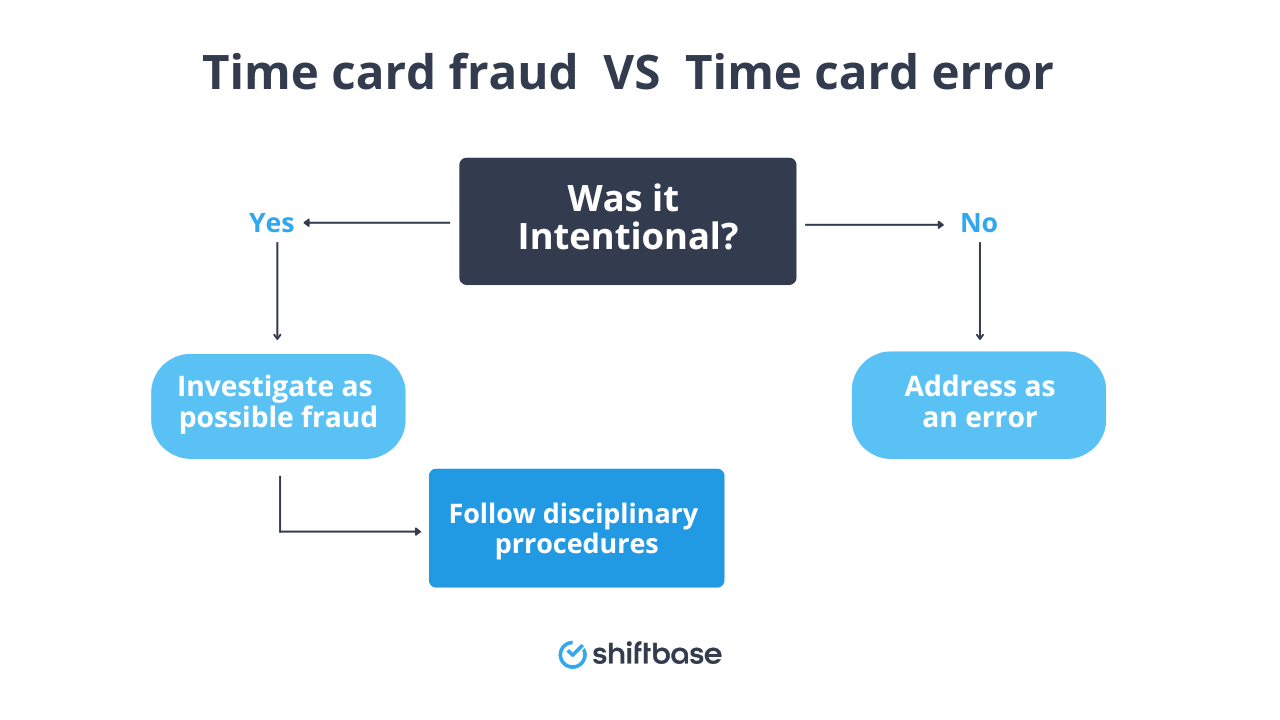Time card fraud might seem small, but it can quietly drain your budget—this guide shows you how to spot it, stop it, and stay compliant.
What is a time card fraud?
Time card fraud is when an employee lies (or ‘fudges the numbers’) about the hours they’ve worked to get paid more than they should. It can happen with old-school paper timesheets, digital punch-in systems, or even fancy apps if no one's keeping an eye on things.
Missed minutes can turn into hours over time, costing your business money, throwing off rotas, and creating tension among honest staff.
👉 And here’s the kicker: if left unchecked, it could lead to legal trouble or reputational damage; especially if you’re not taking reasonable steps to prevent it.
Types of time card fraud
Not all time fraud looks the same. Some are blatant, others sneaky. Here are the most common forms to watch out for:
- Buddy punching: One employee clocks in or out on behalf of another (usually a friend) when they’re running late or absent. It’s teamwork in the worst way.
- Falsifying hours: This happens when someone manually enters more hours than they actually worked—or claims they worked through lunch or breaks when they didn’t.
- Clocking in early or out late: Employees might clock in a bit early and just hang around, or wait to punch out even though they’ve stopped working. It adds time without extra output.
- Ghost shifts: Someone claims to have worked an entire shift that never actually happened. These are rare, but serious.
- Editing digital records: If your system allows employees to adjust their own hours without proper approvals, that’s a big risk. Some might "tweak" time entries in their favour.
- Taking unauthorised breaks: Clocking out late after long breaks or disappearing for personal errands while still ‘on the clock’; it's subtle, but it’s still time theft.
❗Did you know? In 2025, UK employers are under pressure to prove they’ve taken steps to prevent fraud like buddy punching under the new “Failure to Prevent Fraud” offence.
How to identify time card fraud
Spotting time card fraud isn’t always easy; especially when it’s buried in spreadsheets or mixed in with genuine mistakes. But if you know what to look for, the red flags start popping up.
Here’s how to get better at spotting it early:
🔎 Look for patterns in time data
-
Are the same employees always clocking in right on the dot, every day?
-
Do breaks and lunches look too “perfect”?
-
Is someone consistently logging overtime but their output hasn’t changed?
These could be signs someone’s playing the system.
🔎 Check for suspicious buddy behaviour
-
Do two employees always arrive or leave together, even when they’re not scheduled the same?
-
Does someone always vouch for another’s hours?
If it feels too coordinated, it probably is.
🔎 Monitor frequent timesheet edits
-
Do certain employees regularly change their clock-ins or outs?
-
Are edits happening after payroll closes?
You’ll want to audit those records; especially if there’s no manager approval.
🔎 Keep an eye on absenteeism or ghost shifts
-
Someone’s getting paid but their team never sees them?
-
A shift is logged, but CCTV or team leaders say otherwise?
This could point to falsified hours or even "phantom employees."
🔎 Compare hours to output
If someone is logging more hours than others but delivering less work (or none at all) that's a red flag worth looking into

What is the difference between a time card error and fraud?
Let’s not confuse a simple mistake with deliberate dishonesty. Here’s how to tell them apart:
Time card error
This is when an employee makes a genuine mistake on their timesheet. Maybe they forgot to clock out, selected the wrong shift, or misremembered their start time. There’s no intent to deceive; it just happens, especially in busy workplaces.
👉 Example: Sophie forgets to clock back in after lunch, so the system shows she only worked 3 hours. When she sees her payslip, she flags it straight away.
How to handle it:
-
Give employees a chance to correct honest mistakes
-
Use reminders or smart systems to reduce manual input
-
Spot-check regularly to keep things accurate
Time card fraud
This is when someone knowingly lies about the hours they worked to get paid more. It’s intentional, and it usually involves bending the rules, like asking a mate to clock in for them or adding hours they didn’t work.
👉 Example: Liam regularly clocks in his colleague when they’re running late, so it looks like they were both on time every morning.
How to handle it:
-
Investigate and document the issue
-
Follow your disciplinary procedure
-
Consider it a misconduct or even gross misconduct issue

Is time card fraud a felony?
It can be, but it depends where you are and how serious the fraud is.
Let’s break it down:
🇬🇧 In the UK
Time card fraud isn’t called a “felony” (that’s a US legal term), but it can absolutely be considered a criminal offence. Under UK law, it might fall under:
-
Fraud by false representation (under the Fraud Act 2006)
-
Theft, if someone knowingly takes wages they didn’t earn
If it’s proven that an employee intentionally lied to receive pay they didn’t deserve, they could face disciplinary action and legal consequences.
And thanks to the Failure to Prevent Fraud offence introduced in 2025, employers can now be held criminally liable if they haven’t taken reasonable steps to prevent fraud in the workplace. So it’s not just the employee at risk.
🇺🇸 In the United States
Yes, time card fraud can be a felony depending on:
-
The amount of money involved
-
Whether the fraud was repeated or premeditated
-
State laws (some treat even smaller cases seriously)
Generally:
-
Small-scale fraud might lead to civil penalties or job loss
-
Larger or repeated fraud (especially over $1,000 or $2,500, depending on state) can be charged as a felony, which may lead to jail time and a criminal record
Preventing time card fraud
Preventing time card fraud is more than just safeguarding finances; it's about fostering a culture of honesty and integrity. Effective strategies involve both technology solutions and comprehensive policies and training.
Technology solutions for prevention
- Time Tracking Software: Implementing advanced time and attendance tracking software is one of the most effective ways to combat employee falsifying time cards. These systems can provide accurate records of employee hours worked, reducing the opportunity for manual falsification or fraudulent data entry.
- Geofencing Technology: Geofencing sets a virtual boundary, allowing for automatic clock-ins and clock-outs when employees enter or leave a job site. This helps in accurately capturing work hours and prevents buddy punching.
- Biometric Time Clocks: Utilizing biometric time clocks, such as fingerprint or facial recognition systems, can significantly reduce buddy punching and ensure that the employee present is the one clocking in.
Useful Read: Time Clock Buying Guide: Save Time, Money, and Prevent Payroll Errors
- Audit Trails and Alerts: Modern systems can generate audit trails and send alerts for any irregularities or suspicious activities in time records, enabling prompt investigation.
Policies and training
- Clear Company Policy: Establishing a clear, comprehensive policy on timekeeping and communicating it effectively to all employees is fundamental. This policy should cover all aspects of time recording, including consequences for time card fraud.
- Employee Handbook: Incorporate timekeeping policies in the employee handbook. This ensures that every employee understands the expectations and the seriousness of time card fraud.
- Regular Training: Conduct regular training sessions for both employees and management on timekeeping procedures and the ethical and legal implications of time fraud.
- Creating Awareness: Educate employees about the impact of time fraud on the business and their colleagues. Highlighting the broader implications can foster a sense of responsibility and discourage fraudulent behavior.
- Encouraging Honesty: Promote a work culture where honesty is valued and rewarded. Encourage employees to come forward if they make a mistake in their time records without fear of immediate harsh penalties.
Preventing employee time card fraud requires a multifaceted approach, combining the use of technology with robust policies and ongoing education. By doing so, businesses can create an environment where time card fraud is less likely to occur. The following section will discuss how to effectively handle cases of time card fraud.
How to prevent time card fraud with the right tools
You can’t be everywhere at once, but your software can be.
Using a modern workforce management system like Shiftbase helps you spot dodgy timekeeping patterns, reduce manual errors, and keep things fair for everyone.
Here’s how it helps:
-
Time tracking: Say goodbye to messy spreadsheets. Track exact clock-in and clock-out times, and flag suspicious edits automatically.
-
Employee scheduling: Keep shifts organised and transparent so no one can claim hours they weren’t actually assigned to.
-
Absence management: Easily track who’s off and when, so you’ll spot ghost shifts before payroll hits.
It’s not just about catching fraud; it’s about creating a system that makes it harder for it to happen in the first place.
✅ Try Shiftbase free for 14 days Ready to take the stress out of scheduling and time tracking? Start your free trial of Shiftbase today—no strings attached: Sign up here.
You’ll be surprised how quickly your time (and trust) adds up.




